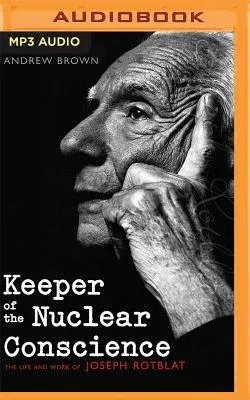As Andrew Brown shows in Keeper of the Nuclear Conscience, Joseph
Rotblat's life--from an impoverished childhood in war-torn Warsaw to an
active old age that brought honors and public recognition, including the
Nobel Peace Prize--is a compelling human story in itself. What gives it
added significance is Rotblat's single-minded dedication to peaceful
causes, particularly his pursuit of nuclear disarmament.
Here is the first full biography of Joseph Rotblat based on complete
access to his private papers. Brown describes how Rotblat overcame
poverty and anti-Semitism to become a nuclear physicist, becoming a key
member of the British team that worked on the atomic bomb in England and
with the Manhattan Project in America. But Rotblat, appalled by the use
of atomic bombs against the Japanese and deeply depressed by the brutal
death of his wife in the Holocaust, soon became one of the prime
architects of the anti-nuclear movement. The book describes his post-war
activities under the shadow of Britain's nuclear program, his first
political and media encounters, his exposure of the hazards of
radioactive fallout, and his friendship with Bertrand Russell. Brown
shows that Pugwash, the anti-nuclear group that Rotblat helped form,
eventually established an invaluable back-channel link that penetrated
the Iron Curtain. Indeed, it was a Pugwash office that facilitated the
first meeting between Gorbachev and Reagan. Gorbachev's security
advisers were heavily influenced by Pugwash ideas, especially the
concept of non-offensive defense in Europe.
Rotblat dedicated the last six decades of his life to peaceful causes
and to efforts to uphold the ethical application of science. In this
engaging biography, we discover a great man whose profound conscience
shaped his life and work, and left an important legacy for future
generations.

